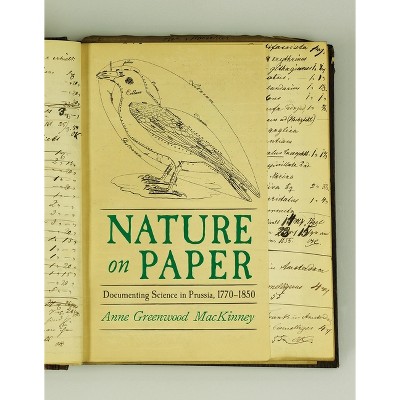Experimenting at the Boundaries of Life - (Sci & Culture in the Nineteenth Century) by Joan Steigerwald (Hardcover)

$60.99 sale price when purchased online
$65.00 list price
Target Online store #3991
About this item
Highlights
- Attempts to distinguish a science of life at the turn of the nineteenth century faced a number of challenges.
- About the Author: Joan Steigerwald is an associate professor in the Department of Humanities, the graduate programs in humanities, science and technology studies, and social and political thought at York University.
- 472 Pages
- Science, History
- Series Name: Sci & Culture in the Nineteenth Century
Description
About the Book
Examines Debates Surrounding the First Articulations of a Science of Life and Experiments on the Processes of Organic VitalityBook Synopsis
Attempts to distinguish a science of life at the turn of the nineteenth century faced a number of challenges. A central difficulty was clearly demarcating the living from the nonliving experimentally and conceptually. The more closely the boundaries between organic and inorganic phenomena were examined, the more they expanded and thwarted any clear delineation. Experimenting at the Boundaries of Life traces the debates surrounding the first articulations of a science of life in a variety of texts and practices centered on German contexts. Joan Steigerwald examines the experiments on the processes of organic vitality, such as excitability and generation, undertaken across the fields of natural history, physiology, physics and chemistry. She highlights the sophisticated reflections on the problem of experimenting on living beings by investigators, and relates these epistemic concerns directly to the philosophies of nature of Kant and Schelling. Her book skillfully ties these epistemic reflections to arguments by the Romantic writers Novalis and Goethe for the aesthetic aspects of inquiries into the living world and the figurative languages in which understandings of nature were expressed.Review Quotes
Experimenting at the Boundaries of Life succeeds admirably in its examination of the complex entanglements of science and philosophy prior to the founding of biology. . . . The philosophical and scientific traditions here explored do not live in isolation from one another, even if disciplinary boundaries often mean that we now treat them this way. Steigerwald's truly interdisciplinary approach to this period demonstrates this fact in ways that are uniquely rewarding and intellectually stimulating.-- "Journal of the History of Biology"
A provocative counter history to vitalist and organicist theories and the absolute idealism of Schelling and Novalis, Experimenting at the Boundaries of Life emphasizes not just the experimental footing of emergent life science but its inevitable inconsistencies and aporias. This extraordinary work is a major intervention not only for historians of the life sciences and German Idealism but also for scholars of Romanticism and current philosophy of biology and science studies.--John H. Zammito, author of The Gestation of German Biology: Philosophy and Physiology from Stahl to Schelling
A vast undertaking. . . . the text is structured in such a way that individual chapters, specific figures, and relevant themes provide captivating and useful insights in isolation.-- "Goethe Studies"
Joan Steigerwald handles an astonishing variety of sources with insight and verve. The story she tells, in both its sweep and its details, challenges entrenched habits and comfortable assumptions of the existing literature and deepens our understanding of the relevant topics, figures, and debates. . . . admirable and informative.-- "Journal of the History of Philosophy"
Joan Steigerwald has written an amazing book, which will attract a wide and ready readership. . . . Her core notion of 'boundaries of life' offers a novel and powerful means by which to organise much of the history of biology.-- "NTM Journal of the History of Science, Technology, and Medicine"
Reading Steigerwald's book at this moment . . . offers a useful reminder of the varied ways life has been and can still be conceived.-- "Schelling-Studien"
Remarkable for its clear elucidation of such an unfocused epistemological terrain. . . . There is, to be sure, much more to say about this remarkable piece of scholarship, equally impressive for its depth and breadth. Upon finishing Experimenting at the Boundaries of Life, every reader, no matter what their background, will be left with the experience akin to the one that comes from attending the best possible graduate seminar: full of knowledge and further questions in equal measure.-- "Eighteenth-Century Studies"
Steigerwald's impressive interdisciplinary work draws together the histories of philosophy, science, and literature to examine attempts to delineate the boundary of the living.-- "European Romantic Review"
Steigerwald's truly remarkable accomplishment. . . impressively draws on the incredibly rich and diverse approaches of an amazing collection of thinkers, artists, poets, and writers at Jena in these years. . . . When we are done we have gained a far richer exposure to the collective wisdom of this time.-- "Centaurus"
About the Author
Joan Steigerwald is an associate professor in the Department of Humanities, the graduate programs in humanities, science and technology studies, and social and political thought at York University.Dimensions (Overall): 9.1 Inches (H) x 7.1 Inches (W) x 1.7 Inches (D)
Weight: 2.25 Pounds
Suggested Age: 22 Years and Up
Number of Pages: 472
Genre: Science
Sub-Genre: History
Series Title: Sci & Culture in the Nineteenth Century
Publisher: University of Pittsburgh Press
Format: Hardcover
Author: Joan Steigerwald
Language: English
Street Date: June 18, 2019
TCIN: 94401780
UPC: 9780822945536
Item Number (DPCI): 247-10-9867
Origin: Made in the USA or Imported
If the item details aren’t accurate or complete, we want to know about it.
Shipping details
Estimated ship dimensions: 1.7 inches length x 7.1 inches width x 9.1 inches height
Estimated ship weight: 2.25 pounds
We regret that this item cannot be shipped to PO Boxes.
This item cannot be shipped to the following locations: American Samoa (see also separate entry under AS), Guam (see also separate entry under GU), Northern Mariana Islands, Puerto Rico (see also separate entry under PR), United States Minor Outlying Islands, Virgin Islands, U.S., APO/FPO
Return details
This item can be returned to any Target store or Target.com.
This item must be returned within 90 days of the date it was purchased in store, shipped, delivered by a Shipt shopper, or made ready for pickup.
See the return policy for complete information.
Trending Poetry



$22.80
was $26.60 New lower price
Buy 2, get 1 free select books
5 out of 5 stars with 4 ratings

Highly rated
$9.85 - $23.09
MSRP $15.99 - $32.99
Buy 2, get 1 free select books
4.8 out of 5 stars with 137 ratings


$20.58
MSRP $30.00
Buy 2, get 1 free select books
5 out of 5 stars with 1 ratings





